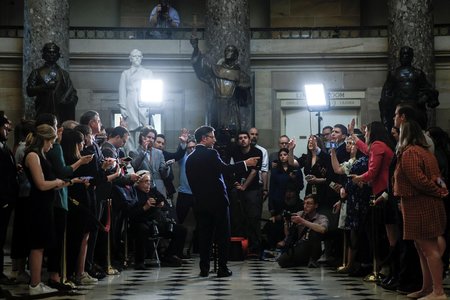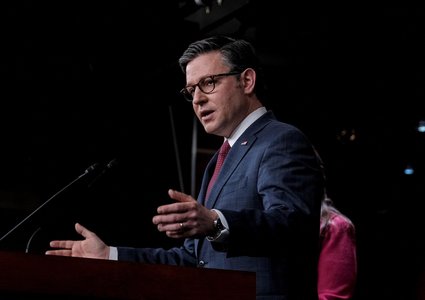Special: Trump's link to Seinfeld, Bill Clinton's role as "First Dude," the future of Obamacare and voter ID laws
Aug. 19, 2016 AT 4:29 p.m. EDT
TRANSCRIPT
Notice: Transcripts are machine and human generated and lightly edited for accuracy. They may contain errors.
ANNOUNCER: This is the Washington Week Webcast Extra .
MR. O’KEEFE: Hello and welcome. I’m Ed O’Keefe, filling in for Gwen Ifill. Joining me around the table, Alexis Simendinger of RealClearPolitics, Josh Green of Bloomberg Businessweek , Reid Wilson of The Hill , and Abby Phillip of The Washington Post .
Abby, I want to pick up with you. We were talking a little bit during the broadcast about the Clinton Foundation. More broadly, I’ve thought for a while that this speaks to the question of what to do about Bill in the event that she becomes president and he becomes the first first dude, or first man, but also happens to be a former president. Do they have any sense of what that will look like? And are they prepared, going into the fall, to face more questions about this, should it come up either from Trump or from other folks?
MS. PHILLIP: Yeah. Well, we learned that this week that he’s not really good at baking cookies. They had to submit their cookie recipes, the sort of quadrennial spouse cookie recipe. And he submitted Hillary Clinton’s. So that’s off the table. (Laughter.) But you know, they’ve talked a lot about putting him in charge of the economy in some way or some form. We know that’s not going to be any kind of formal role, but it’s going to be something that involves him going around the country and sort of talking about economic development. What it can’t be is anything in any way, shape or form involving the Clinton Foundation, and really the work that it does.
Because the problem for Bill Clinton is that he is sort of the quintessential operator. He brings this person in contact with that person. And that is not an activity that he can really be engaged in while she’s president, because it’s always going to raise questions about undue influence from corporations or foreign governments, or so on and so forth.
MR. O’KEEFE: And in fact, this September will be the final Clinton Global Initiative when he convenes people in New York, right?
MS. PHILLIP: That’s right. So even if the Clinton Foundation itself survives her election, then CGI is not going to happen. And CGI was the main vehicle for those kinds of connections to happen. It’s the place where he would sort of, like, put this person in touch with that person. You get sort of, like, this great platform with the former president. They recognized very clearly that that can no longer go on, regardless of what happens.
So we’ll see what he does, but they also have to be very careful with him. He’s not on the trail a whole lot these days. Part of that has to do with just sort of keeping him out of the line of fire for Trump, and also preventing him from making mistakes and gaffes. He is getting up there in age. He can’t be out there as much as he would like to be, perhaps, and as much as – you know, as they might want him to.
MR. O’KEEFE: And to put a button on it, if it survives the current plan is for Chelsea Clinton to sort of take over the Foundation, right?
MS. PHILLIP: That’s the – that’s the thing that is rumored to happen. But again, I don’t necessarily think that is nailed down, partly because a lot of people have raised questions about what’s the difference between Chelsea Clinton taking over and Bill Clinton being in charge of it? It just – the conflict of interest and the potential there remains.
MR. O’KEEFE: Important development this week that maybe was missed amid misbehaving Olympic swimmers and staff shakeups in presidential campaigns, some of the major health care companies in this country, Alexis, said they’re pulling out of the health care exchanges, causing yet another blow for Obamacare, just a few months here before the election, and right before open enrollment season begins.
MS. SIMENDINGER: It is an important story, because it not only deals with the economic situation now and what’s happening in the health care arena now under the Affordable Care Act, but it also looks ahead to what might be necessary if we see Congress return in one complexion or another, and what might happen legislatively. So in this case, this was the biggest – Aetna and Humana were talking about a merger. And Cigna and another health care company were talking about a merger. And the Justice Department is now opposing it, and saying that they’re going to file suit against letting these two mergers go through.
The element of the insurers are saying, look, you know, we think that we’re losing money on this so we’re going to pull out of some of these exchanges. And we can talk about whether they were – all of this is in line with their being upset about the Justice Department filing suit to prevent these mergers. But the truth is that there are problems under the Affordable Care Act that need to be addressed. And one of them is that these exchanges – now, remember, only 5 percent of those who are insured are in these exchanges, this is not all of America – but that they’re finding that these exchanges are getting the sickest of patients and clients, not the healthiest.
And so one of the things that’s being talked about is should there be bigger subsidies? Should there be more outreach to get healthier people into the exchanges? And what’s going to happen to the competitiveness? Should there be a public option in the way that, for instance, Secretary Clinton has argued there should be? Donald Trump says he’d pull out ACA by the roots – the Affordable Care Act – by the roots and replace it. But he hasn’t said with what.
MR. O’KEEFE: And this is exactly the kind of – not necessarily an October surprise, but the kind of thing that rubs off potentially on the Clinton campaign, because if she really is aligning herself so closely with the president, she’s inheriting his legacy. She, by extension, could get blamed for all this.
MS. SIMENDINGER: She’s committed, though. I would argue she is committed to saying that she would work hard to improve the Affordable Care Act, to work with Congress to make the changes to continue to make it work. And she has – she has gone down that road so far, that it would be hard for me to imagine that she would reverse herself.
MR. GREEN: Is there any sign – Republicans in Congress have been so recalcitrant about doing anything but repealing the Affordable Care Act. I think they voted 50-something times to remove it. Is there any sign that they would be willing to strike some kind of a deal to improve the law, rather than just to strike it off the books?
MS. SIMENDINGER: That would depend on who is in the White House and what has happened in the Senate. It’s unlikely to the House would flip to Democrats, but Reid would know better about whether we’re going to be in a wave election. But if Congress changes in a really dramatic way, and we end up with a Democratic Senate, I could see that there might be some long-range efforts to make some adjustments.
MR. WILSON: To Ed’s point though, how many times have we seen a big deal like this happen about the Affordable Care Act, that then gets overshadowed by something else? At the very beginning when open enrollment started, the first 16 days when everything was such a disaster, the government was shut down because of Ted Cruz and the Republicans.
MS. SIMENDINGER: Well, the narrative, though, also includes positives, which is that there are millions more people who are insured, and also the cost of health care – health care costs overall have stayed muted. So you know, the insurance companies want to be in this market, they just want healthier people in that marketplace. So I think the skirmishing is going to continue.
MR. O’KEEFE: Fun fact: Next month Americans can start voting for president in some places. But there’s one big battleground state that might not be able to start voting early, as they were expecting to: North Carolina. I know there’s been some developments there this week.
MR. WILSON: Well, Ed, we’re about 80 – what is it – 84 days out from the election. And yet there are still some states in which we don’t actually know the rules under which the elections will be operated, because of ongoing litigation over things like voter identification laws, in states like Texas and Wisconsin and, most notably, in North Carolina. The North Carolina voter ID law, and a big part of what they’re litigating down there, doesn’t just have to do with voter ID. It has to do with whether or not you can cast a ballot in a precinct that’s not yours, when early voting is supposed to start, whether or not you can pre-register to vote – that is if you’re, you know, 17 years old you sign up and then you’ll be registered when you turn 18.
And one piece of this that a lot of people are talking about right now is when early voting will actually be able to start. They have to – under the new law, they have to open this early voting for a specific number of hours over X number of days. They’re arguing – the court has blocked part of that, saying essentially that it would unduly burden some voters who are more likely to vote early. There’s a difference – early voting tends to be more Democratic heavy. Absentee voting, that is you get your ballot in the mail and you send it back, tends to be more Republican heavy, in some Southern states. So this very clearly has an impact on who has access to the polls at times when they’re comfortable and able to go and vote. And it is the latest front in voting wars that are happening across the country.
MR. O’KEEFE: Remind us where else.
MR. WILSON: Texas and Wisconsin are still fighting over their own voter ID laws. But on the other hand you’ve got sort of the conservative legislatures that have passed these measures. On the other hand, there are liberal legislatures that have passed measures that automatically register people to vote in states like California and Louisiana – or excuse me – Illinois, where the governor just vetoed that legislation. So the voting wars are bipartisan. We are the only major Western democracy that does not have centralized, federalized election rules. And that’s really playing out in the states.
MS. PHILLIP: We know that the Clinton campaign is aggressively organized around early voting and around some of these rules. But do you get any sense on the Republican side that they understand how they’re going to work around the kind of changing landscape this fall?
MR. WILSON: Yeah, well, one of the really fascinating things that we’ve seen is the lawsuits that the Clinton campaign’s general counsel, Marc Elias, is advancing in a lot of these states. Virginia and Arizona are – they’re talking about some different parts of election law. It really represents a new approach to the Voting Rights Act, which was struck down by the Supreme Court a couple of years ago. And now instead of the onus being on some states to prove that their election law changes are not going to be a burden to specific populations, now the onus is on those specific populations to prove that they have been burdened by the changes. So both sides are sort of still feeling out this legal territory. And it’s not something that’s going to end with the 2016 campaign.
MR. O’KEEFE: And the North Carolina case so important because you have not only a competitive presidential race, but now increasingly an increasingly competitive Senate race –
MR. WILSON: A hot Senate race, a hot governor’s race.
MR. O’KEEFE: And a governor’s race, right, exactly.
Remember that show about nothing, Seinfeld ? Well, guess what? There’s a connection to the Donald Trump campaign now. As we mentioned, you, Josh, wrote this great profile of Stephen Bannon last fall. And tucked in there is word that he actually made a little bank, if you will, off of Seinfeld , right?
MR. GREEN: Well, Bannon was a, you know, pretty rich Goldman Sachs investment banker, started his own boutique firm in Hollywood. And a lot of what he did was to orchestrate media mergers. And a lot of his money, I found out, comes from – there was a deal he put together between Castle Rock Pictures, which owns Seinfeld , and Ted Turner, who we all know. And when they got to the table, as Bannon tells it, Turner was a little short of cash. And in lieu of his ordinary fee, Bannon accepted residuals to five Castle Rock shows, including Seinfeld , which was then only in its third season. It was considered to be the runt of the litter. Bannon told me that they didn’t project a lot of earnings going forward from that show, but as we all know it turned out to be one of the all-time classics. And that is the money that helped kind of fuel the rise of Bannon, and now Donald Trump.
MR. O’KEEFE: And yadda, yadda, yadda, the rest is history. (Laughter.)
Well, look, we got to go, but stay online all week long and check out the News You Need To Know on the Washington Week website. That’s, of course, at PBS.org/WashingtonWeek. And that’s all for this edition of the Washington Week Webcast Extra . I’m Ed O’Keefe. Take care.
MOST POPULAR


Full Episode: Washington Week with The Atlantic full episode, 4/19/24


Clip: Will Democrats rescue Johnson's speakership to protect aid for Ukraine and Israel?


Clip: Attacks in Israel and Iran bring more uncertainty to Middle East

Preview: Coming Up on Washington Week with The Atlantic


Full Episode: Washington Week with The Atlantic full episode, 4/12/24

© 1996 - 2024 WETA. All Rights Reserved.
PBS is a 501(c)(3) not-for-profit organization

